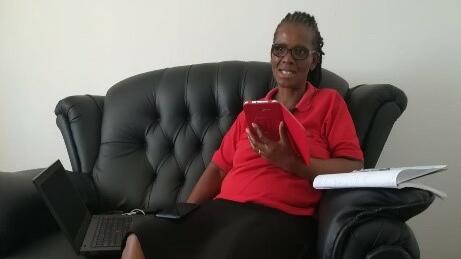
November 2019 marked the start of a research study, to assess the feasibility and acceptability of an antenatal care package to improve outcomes in subsequent pregnancies following stillbirth. I felt a mix of excitement and anxiety: I was happy to start something new but anxious about the outcome.
My work involved collecting different types of data from women booking for antenatal care at the nearby maternity unit; Mpilo Central Hospital, Bulwayo, Zimbabwe.
To start with I needed to explain the study in lay language to ensure the woman understood in order to consent to participate; then 3 questionnaires needed to be completed with each woman: 1) a questionnaire to assess their level of understanding of birth preparedness 2) a scale to rate their worries around childbirth (Cambridge Worry Scale), and 3) a case report form with past and current obstetric details. When the women reached 37 weeks’ gestation I conducted an interview with them to explore their experiences of the care received.
Despite a systematic schedule of interviews with all women, challenges were present. Firstly, I had to translate the interview schedule to local languages (Shona or Ndebele), and conduct the interview in the client’s preferred language. This was done simultaneously as I needed to clarify questions while going through the interview guide. Interviews were longer than expected to ensure participants could elaborate their thoughts and provide high level of detail. Secondly, some women were more reserved and provided short answers. In these occasions I had to use various communication skills to probe for the type of information I required, it was a real achievement when I was successful.
In some instances, women became emotional while recalling the details of their previous stillbirth experience. I used my midwifery and counselling skills to reassure them and confirm whether they were willing to continue or preferred to reschedule. I was fortunate that all women wished to continue after a brief break.
During these interviews, I also had to deal with my personal feelings and emotions, as I was touched by their difficult experiences. I felt I was torn between being a researcher and a midwife. I too found I needed emotional support. This was addressed by having regular debriefing sessions with my colleague Sikhululekile Mremi and the country lead Kushupika Dube.
Some days were busier than others: on some busy days I felt exhausted with interviewing 3 mothers one after another; but as the days went by I became stronger and more able. I needed to conduct the last interviews by telephone due to social distancing measures related to COVID-19. In this new scenario, I had to explain the reasons for telephone interviews and record consent verbally. In the first telephone interview I was a bit nervous, as the questions linked to the 3 questionnaires to be completed over the phone. While the participants gave their answers to the questions, I used the laptop to enter the data. I also kept a notebook to scribble some information which I later added onto the forms. To avoid missing key information, I preferred to double record using the phone and the digital recorder.
Though there may be some differences between face to face and telephone interviews, like inability to observe some mannerisms and expressions during a telephone interview, all interviews require the same communication and cognitive skills for their success.
Lessons learnt from interviewing (both face-to face and over the phone) included the need for patience to allow clients the time to explain themselves and share the details of their experiences. I also appreciate the importance of being empathetic with these women, allowing them to express their emotions while sharing the traumatic experience of their loss.
Compiled by Grace Danda –
Research Assistant – LAMRN Zimbabwe